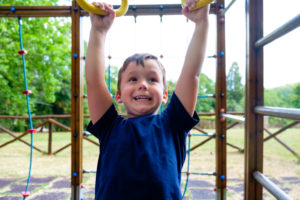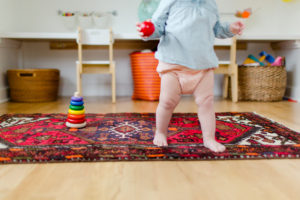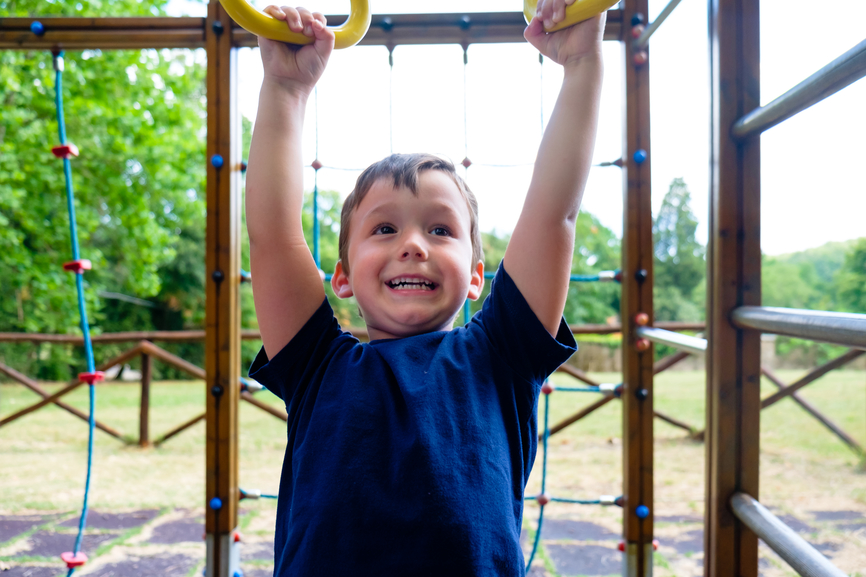
I live in a town where kids’ sports teams seem to have gone a little bananas. Now, given I have never had a 7 year old anywhere else, I don’t have much to compare this to, but last week I overheard a conversation between parents, and to sum it up, here is the news: if your kid does not make the competitive, travels every weekend, and by the way is super pricey soccer team in second grade, well, bye bye soccer, because they are washed up, behind, and stuck in doors from here on out. (If you are reading this and are thinking “ I have a newborn baby, what’s this got to do with me? Hang in there, I’m bringing this around, and it absolutely applies to baby raising!) It’s easy to get swept up in this. Having heard this message loud and clear, my husband asked if we should get my little man some private soccer coaching to help him prep for his tryout. Did I mention he’s 7? So, I have this kid who loves sports. He likes soccer, in fact he really loves being part of the team, and he’d be super bummed if he had to stay in doors for the rest of his life. Does he come home every day and on his own decide to practice soccer? NO! Because he’s 7. We had to really grapple with this one. While I certainly want to support my child’s interest and set him up for success, was this too much?
By stepping in, and over helping would I be inadvertently robbing my son of the opportunity to decide what loves and wants to work hard at and, as a result also rob him of all the juicy learning opportunities and internal motivation that come from failure? The research says, YES.
This whole conversation has me thinking about resiliency and how to foster self esteem in our kiddos from the start. Anxiety is on the rise in young children, especially prevalent in more affluent communities. One theory is that with all this opportunity and lack of struggle, kids are not learning how deal with challenges, come back from mistakes and are anxious about not living up to whatever label they have been ascribed such as, “smart”, “good at sports”. In an effort to make our children feel good about themselves, we may have over-praised, resulting in reduced achievement, and causing our kids to lose their inner drive, and instead be motivated simply to get more praise.
“If parents want to give their children a gift, the best thing they can do is teach their children to love challenges, be intrigued by mistakes, enjoy effort and keep on learning. That way their children don’t have to be slaves of praise. They will have a life long way to build and repair their confidence." - Carol Dweck
This teaching begins when our kids are babies. Partly because this may be almost like learning a new language for parents as we tune into the quality of our praise and feedback. How we speak to our children as babies can absolutely have an effect on their own relationships with challenge and managing frustrations big and small.
Here are a few of my tips for encouraging resiliency and a love of learning:
1. Lose “Good Job”
This is a tough one and part of why I say, start when they are babies, because you will probably need some time. Now, this is not about never praising your child, it’s about thinking about the quality of your praise. Babies are absolutely developmentally in need of our feedback, but when I think about the times I say “ good job “ to my kids, it’s usually when I’m making dinner, driving, or thinking about something else and don’t know what else to say. There are a couple of negative side effects to “ Good Job”. First, if my kiddo says “ Look at my painting!” and I say “ Good Job!” I have just decided the feeling child should have about their work. Perhaps it would have been more meaningful, for me to notice, “ Oh, I see you used a lot of purple, what do you like about this?” This gives them room to say either ‘“ yes! I love the splash of red, and that I worked so hard on it” and feel proud…or “ I don’t actually like it, I was showing it to you because it's funny how bad it is.” Another example, baby eats some pureed veggies and we say while clapping and perhaps throwing confetti “ oh, good job, you did it!” what message does this send to baby? Do we want baby to eat because it makes mommy happy? Is it bad if I don’t actually enjoy blueberries, or am not hungry? Does this foster a healthy relationship with food? Perhaps a different approach that encourages baby’s internal locus of control would be “ oooh, it looks like you are liking those blueberries, did you want more?” The second piece, (well actually I could talk about this one for hours, but I’ll just go over two) is that research has found that saying “Good Job” constantly to our kids actually reduces achievement. What?! I know. Not only does this statement get in the way of independence pleasure and interest, research has found overwhelmingly that kids that are praised for a task tend to stumble on the next, and do not do as well as children who were not praised at all. They are afraid to try, afraid to make a mistake and avoid the challenge. For our babies that learn to walk, Let’s praise the process as opposed to the end goal. So, when your little begins to take those first steps, instead of “good job!” , perhaps a more meaningful and motivating statement, would be “ Look at you, you are standing on your big strong legs, using all your muscles and trying so hard.” It’s the effort they crave, and I would argue, need us to acknowledge not the end result. There is vast defiance between sharing in our babies experience and superimposing our own feelings. And, by the way, our kids, they know, even as babies, when they didn’t actually do that good of a job, or try that hard, so it’s ok to notice that too.

2. Avoid Labels
So, Carol Dweck, a psychologist at Stanford, studied the effects of praise on grade schooler, and it’s pretty fascinating. To sum up, after giving two groups of kids a test, one group was told “ you must be really smart at this” while one was told “ you must have worked really hard at this.” Then the kids were given a choice for the second round and told that one test was more difficult, but they would learn a lot. Most of the “smart kids” took the easy road, while the other group overwhelmingly chose the more difficult task. The reason? The kids that were labeled “smart” wanted to stay looking that way, assumed they were born that way, AND had were afraid to fail and lose their label. The kids who were praised for their effort got the message that achievement was something in their control and were excited by the challenge rather than motivated by the praise. We all have skills that may come easier to us than others. But man, doesn’t it feel so much better when you accomplish something you have worked at than something that was easy from the start? If I just label my kiddo as “ good at sports”, what happens to him if he wants to be in the play, or the chess club? Will he try if it may not come naturally, or does he feel too boxed in to his “Sporty Guy” role. When in doubt, I try to go with “ wow, you must have worked really hard, or practiced, etc.” I will admit, I'm actually predisposed to not want to try things unless I know I will be good at them, and I am aware this is an area where I need to stretch myself as a parent. Even though no one in life has ever complimented my sporting abilities, I make it a point to get out of my comfort zone and get in on the action with my boys. When I am out there playing catch with my sons, know what they say? " Dang, mom you really need to practice." They could be grossly overestimating my abilities, but you get the point.
I want my littles to understand that they have power over a situation because they can influence the result given their effort.
3. Model Trying and Failing
Oh yeah, they’re watching us. Some of my most beautiful parenting moments have come from what I call “my mommy fails”, and have turned into awesome teachable moments. I’ll never forget when my son was a toddler and we were talking about making mistakes and crying and he said “ but grown ups know how to do everything and don’t cry.” Uh Oh. Um, if you read my last post, you know how important I think it is for my sons to be sensitive dudes who are not afraid to let their tears out. In an effort to make my kids feel safe and secure, I think I forgot to let them know that adults cry, they get sad, they make mistakes and they get frustrated. Even your dad! We can do this by pointing out your own daily challenges like “ Yep, these cookies I made don’t taste that good. Looks like I got distracted and left them in the oven too long. I got super frustrated because I was excited to eat them. I guess I need to pay more attention to the clock next time.” Or, “ Daddy and I had some big feelings and got upset with each other and I cried because he hurt my feelings. We both had to talk to each other about our big feelings so we could understand each other and now we feel better.”
Yikes, I know, but super important for us, as the teachers to model trying, failing AND repair whether that is repairing your burnt cookies or relationship repair and conflict resolution while offering our littles an emotional language to make sense of it all.
 For me, the experience of being a mother is a constant process of letting go. In fostering self esteem and resiliency in my children, some letting go definitely needs to happen, and it’s so hard! How can I raise the bar by doing less? By taking our praise to a higher level, our babies can learn to do things, not to please us as parents, but instead will learn about their own passions and develop an internal locus of control….which, trust me, we will want them to have that as teenagers! Being the witness as opposed to the judge, determining if this action is good vs. bad, can have lasting effects on how are littles think about and view themselves in this world. With babies, adopting a Wait, Watch and Wonder approach allows you to connect in a deeper and more meaningful way to them as you share in ALL of their moments, easy and challenging, successes and total wipeouts.
For me, the experience of being a mother is a constant process of letting go. In fostering self esteem and resiliency in my children, some letting go definitely needs to happen, and it’s so hard! How can I raise the bar by doing less? By taking our praise to a higher level, our babies can learn to do things, not to please us as parents, but instead will learn about their own passions and develop an internal locus of control….which, trust me, we will want them to have that as teenagers! Being the witness as opposed to the judge, determining if this action is good vs. bad, can have lasting effects on how are littles think about and view themselves in this world. With babies, adopting a Wait, Watch and Wonder approach allows you to connect in a deeper and more meaningful way to them as you share in ALL of their moments, easy and challenging, successes and total wipeouts.
xxSusan
PS: Want to nerd out with me on this topic and are not in Mama + Babe? Email me and I can send you some articles!








 As a psychotherapist specializing in postpartum depression and anxiety, what I often see on the postpartum end of things is moms having experienced trauma from their births, shame at how things went down and an overwhelming feeling of having let their babies and themselves down.
As a psychotherapist specializing in postpartum depression and anxiety, what I often see on the postpartum end of things is moms having experienced trauma from their births, shame at how things went down and an overwhelming feeling of having let their babies and themselves down. 

 I recently heard this story about a Gorilla who was raised in captivity. I am probably about to leave out approximately one million tiny details in this story, but It goes like this: once upon a time, there was a female gorilla named “Maggie.” Maggie was born and raised in a zoo, where for unknown reasons, she was the only female. At a certain point, it was decided that the time had come for Maggie to have a gorilla baby. The powers that be brought in a male gorilla, they did their gorilla business, and lo an behold, Maggie gave birth to a beautiful baby gorilla. Now, remember, Maggie, being raised in captivity, had never seen a mother and baby. When Maggie gave birth, she stared at her baby, and the zookeepers were shocked to observe that she looked almost confused, walked away without picking up, or feeding the baby gorilla. In the weeks to follow, no one was successful in getting Maggie to attach to her baby, let alone feed the baby. Sadly, the baby passed away shortly thereafter. Thinking this had to be an anomaly, the zoo keepers decided to give it another go, and Maggie became pregnant again.
I recently heard this story about a Gorilla who was raised in captivity. I am probably about to leave out approximately one million tiny details in this story, but It goes like this: once upon a time, there was a female gorilla named “Maggie.” Maggie was born and raised in a zoo, where for unknown reasons, she was the only female. At a certain point, it was decided that the time had come for Maggie to have a gorilla baby. The powers that be brought in a male gorilla, they did their gorilla business, and lo an behold, Maggie gave birth to a beautiful baby gorilla. Now, remember, Maggie, being raised in captivity, had never seen a mother and baby. When Maggie gave birth, she stared at her baby, and the zookeepers were shocked to observe that she looked almost confused, walked away without picking up, or feeding the baby gorilla. In the weeks to follow, no one was successful in getting Maggie to attach to her baby, let alone feed the baby. Sadly, the baby passed away shortly thereafter. Thinking this had to be an anomaly, the zoo keepers decided to give it another go, and Maggie became pregnant again.